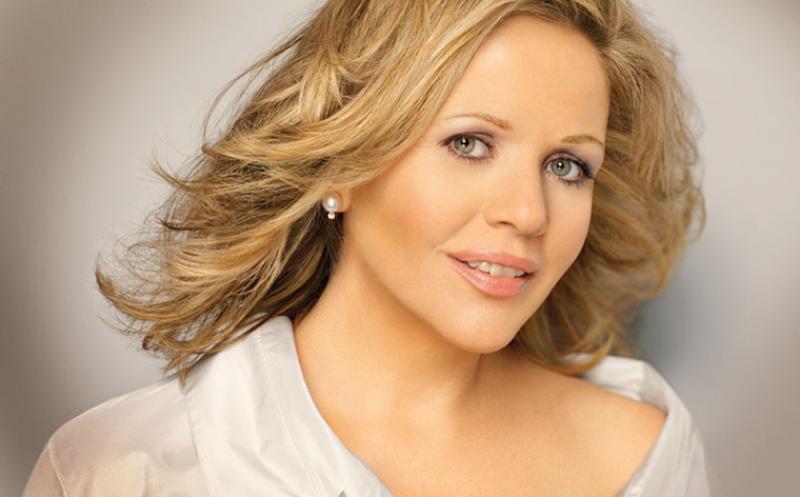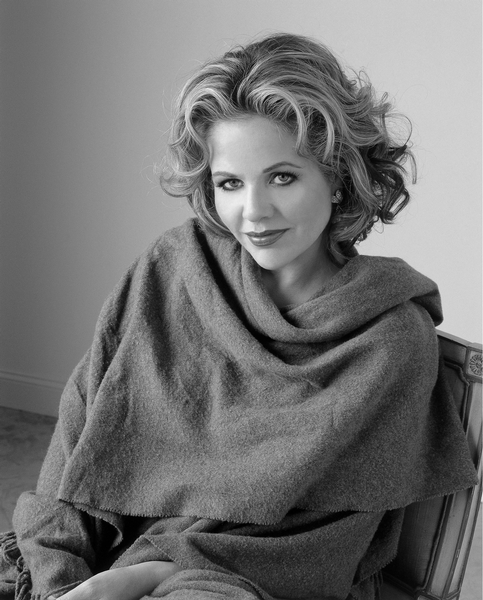Renée Fleming, Barbican Hall | reviews, news & interviews
Renée Fleming, Barbican Hall
Renée Fleming, Barbican Hall
A cream-laden Viennese recital from the incomparable soprano

Say what you like about America, but it certainly knows how to turn out an opera diva. While the Russians and even Italians can be chilly and untouchable in their splendour, there’s a cultivated ease with the likes of Renée Fleming and Joyce DiDonato that allows a song recital to be both a relaxed conversation with an old friend and a piece of highly crafted technical showmanship.
The Barbican Hall isn’t a natural venue for a song recital, but it gave Fleming the space to really let go when the music demanded it in a programme of songs from turn-of-the-century Vienna. Familiar cycles from Wolf and Mahler in the first half morphed into the more progressive textures of Zemlinsky and Schoenberg in the second, with Korngold (and echoes of Johann Strauss II) supplying the necessary dose of kitschy gemütlichkeit.
It’s easy to be so impressed by Fleming's technique that you forget to be moved
Wolf’s Goethe Lieder opens in an explosion of Spring, and Fleming’s gilded tone gave us primroses, snowdrops and crocuses in vivid abundance. Yet in this, as in much of the cycle and the Rückert-Lieder that followed, the sense was of an orderly, cosmopolitan flower-shop rather than a riot of nature. Her shepherdess in “Die Spröde” was almost too sophisticated in her coyness, though none the less charming for that.
 There’s something wonderfully conversational, almost recit-like in Fleming’s treatment of these songs - something echoed, though not always successfully, by her pianist Maciej Pikulski (pictured right) - which comes into its own in their more declamatory, dramatic moments. Moods are always on the move, always surging or retreating into different emotional spaces. But in the contemplative stillness of the mood-miniatures – Wolf’s “Anakreons Grab”, Mahler’s “Um Mitternacht” and “Ich bin der Welt abhanden gekommen” – sometimes her very skill becomes intrusive. It’s easy to be so impressed by her technique that you forget to be moved. That, or so fascinated by her increasingly mannered portamentos that you start taking bets on the interval of the next one.
There’s something wonderfully conversational, almost recit-like in Fleming’s treatment of these songs - something echoed, though not always successfully, by her pianist Maciej Pikulski (pictured right) - which comes into its own in their more declamatory, dramatic moments. Moods are always on the move, always surging or retreating into different emotional spaces. But in the contemplative stillness of the mood-miniatures – Wolf’s “Anakreons Grab”, Mahler’s “Um Mitternacht” and “Ich bin der Welt abhanden gekommen” – sometimes her very skill becomes intrusive. It’s easy to be so impressed by her technique that you forget to be moved. That, or so fascinated by her increasingly mannered portamentos that you start taking bets on the interval of the next one.
 The Schoenberg that welcomed us back after the interval was a different story – artlessly direct, searching out the melody in the disjunct lines of “Erwartung” Op. 2 No. 1 and investing us absolutely in the chilling fate of “Jane Grey”. This modernist ballad offered a bizarre and wonderful contrast to the abortive, inscrutable Zemlinsky fragments that followed. His Fünf Lieder auf Texte von Richard Dehmel allow their texts the freedom their images demand, glorying in unexpected turns and harmonic dead-ends as they hardly dare utter the poet’s unfulfilled longings and unspokens. Fleming carefully weighted her delivery, never pulling too hard on these delicate shreds of music, precise but never rigid in her interpretational choices.
The Schoenberg that welcomed us back after the interval was a different story – artlessly direct, searching out the melody in the disjunct lines of “Erwartung” Op. 2 No. 1 and investing us absolutely in the chilling fate of “Jane Grey”. This modernist ballad offered a bizarre and wonderful contrast to the abortive, inscrutable Zemlinsky fragments that followed. His Fünf Lieder auf Texte von Richard Dehmel allow their texts the freedom their images demand, glorying in unexpected turns and harmonic dead-ends as they hardly dare utter the poet’s unfulfilled longings and unspokens. Fleming carefully weighted her delivery, never pulling too hard on these delicate shreds of music, precise but never rigid in her interpretational choices.
A selection of songs from Erich Korngold did little to restore a reputation that has become so disproportionately dominated by his film scores. A rather formulaic setting of Rosetti’s “When I am dead, my dearest” drew some beautiful characterisation from Fleming, and in “Was du mir bist?” she proved unequivocally that she still has the big money notes at the top – pealing out with such easy power. Pikulski’s loose, rather haphazard style too found more place to spread out here in Korngold’s maximalist accompaniments than among the fragile specificity of the Mahler.
By this point the party was just beginning, with closing number “Frag mich Oft” (a schlagobers-filled homage to Straus II that is Vienna at its most indigestible) segueing into a trio of encores that opened with the programme’s musical elephant in the room: Richard Strauss. It’s glorious to hear Fleming on home turf, and “Zueignung” was a polished delight. A palate-cleansing “sorbet” of Delibes’ “Les filles de Cadix” went off the rails with much mirth, winning over everyone not already firmly in the Fleming fan-club, only to be followed by a finale of Korngold’s “Mariettas lied” from his opera Die tote Stadt . This deliciously excerptable morsel is simplicity itself, and if the delivery wasn’t quite as straightforward then Fleming had fully earned her right to coax and coddle it as she wished. She’s still opera’s reigning diva, and by the sound of this recital has no plan to hand over her crown any time soon.
rating
Explore topics
Share this article
The future of Arts Journalism
You can stop theartsdesk.com closing!
We urgently need financing to survive. Our fundraising drive has thus far raised £49,000 but we need to reach £100,000 or we will be forced to close. Please contribute here: https://gofund.me/c3f6033d
And if you can forward this information to anyone who might assist, we’d be grateful.

Subscribe to theartsdesk.com
Thank you for continuing to read our work on theartsdesk.com. For unlimited access to every article in its entirety, including our archive of more than 15,000 pieces, we're asking for £5 per month or £40 per year. We feel it's a very good deal, and hope you do too.
To take a subscription now simply click here.
And if you're looking for that extra gift for a friend or family member, why not treat them to a theartsdesk.com gift subscription?
more Classical music
 Robin Holloway: Music's Odyssey review - lessons in composition
Broad and idiosyncratic survey of classical music is insightful but slightly indigestible
Robin Holloway: Music's Odyssey review - lessons in composition
Broad and idiosyncratic survey of classical music is insightful but slightly indigestible
 Classical CDs: Wolf-pelts, clowns and social realism
British ballet scores, 19th century cello works and contemporary piano etudes
Classical CDs: Wolf-pelts, clowns and social realism
British ballet scores, 19th century cello works and contemporary piano etudes
 Bizet in 150th anniversary year: rich and rare French offerings from Palazzetto Bru Zane
Specialists in French romantic music unveil a treasure trove both live and on disc
Bizet in 150th anniversary year: rich and rare French offerings from Palazzetto Bru Zane
Specialists in French romantic music unveil a treasure trove both live and on disc
 Scottish Chamber Orchestra, Ibragimova, Queen’s Hall, Edinburgh review - rarities, novelties and drumrolls
A pity the SCO didn't pick a better showcase for a shining guest artist
Scottish Chamber Orchestra, Ibragimova, Queen’s Hall, Edinburgh review - rarities, novelties and drumrolls
A pity the SCO didn't pick a better showcase for a shining guest artist
 Kilsby, Parkes, Sinfonia of London, Wilson, Barbican review - string things zing and sing in expert hands
British masterpieces for strings plus other-worldly tenor and horn - and a muscular rarity
Kilsby, Parkes, Sinfonia of London, Wilson, Barbican review - string things zing and sing in expert hands
British masterpieces for strings plus other-worldly tenor and horn - and a muscular rarity
 From Historical to Hip-Hop, Classically Black Music Festival, Kings Place review - a cluster of impressive stars for the future
From quasi-Mozartian elegance to the gritty humour of a kitchen inspection
From Historical to Hip-Hop, Classically Black Music Festival, Kings Place review - a cluster of impressive stars for the future
From quasi-Mozartian elegance to the gritty humour of a kitchen inspection
 Shibe, LSO, Adès, Barbican review - gaudy and glorious new music alongside serene Sibelius
Adès’s passion makes persuasive case for the music he loves, both new and old
Shibe, LSO, Adès, Barbican review - gaudy and glorious new music alongside serene Sibelius
Adès’s passion makes persuasive case for the music he loves, both new and old
 Anja Mittermüller, Richard Fu, Wigmore Hall review - a glorious hall debut
The Austrian mezzo shines - at the age of 22
Anja Mittermüller, Richard Fu, Wigmore Hall review - a glorious hall debut
The Austrian mezzo shines - at the age of 22
 First Person: clarinettist Oliver Pashley on the new horizons of The Hermes Experiment's latest album
Compositions by members of this unusual quartet feature for the first time
First Person: clarinettist Oliver Pashley on the new horizons of The Hermes Experiment's latest album
Compositions by members of this unusual quartet feature for the first time
 Gesualdo Passione, Les Arts Florissants, Amala Dior Company, Barbican review - inspired collaboration excavates the music's humanity
At times it was like watching an anarchic religious procession
Gesualdo Passione, Les Arts Florissants, Amala Dior Company, Barbican review - inspired collaboration excavates the music's humanity
At times it was like watching an anarchic religious procession
 Classical CDs: Camels, concrete and cabaret
An influential American composer's 90th birthday box, plus British piano concertos and a father-and-son duo
Classical CDs: Camels, concrete and cabaret
An influential American composer's 90th birthday box, plus British piano concertos and a father-and-son duo
 Cockerham, Manchester Camerata, Sheen, Martin Harris Centre, Manchester review - re-enacting the dawn of modernism
Two UK premieres added to three miniatures from a seminal event of January 1914
Cockerham, Manchester Camerata, Sheen, Martin Harris Centre, Manchester review - re-enacting the dawn of modernism
Two UK premieres added to three miniatures from a seminal event of January 1914

Add comment